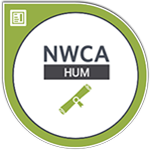PURPOSE
The Humanities credential documents the general knowledge related to the history and cultural contributions of societies from early Mesopotamia and Egypt through the Renaissance, including the origins and effects of Christianity’s and Islam’s expansion in Medieval times.
AUDIENCE
This credential is appropriate for those require a knowledge of history and its cultural significance such as historians, history and humanities interns, archivists, anthropologists and archaeologists, editors and journalists, museum curators and workers, teachers and community educators, political scientists, sociologists, and those who research or write for a variety of purposes.
JOB/CAREER REQUIREMENTS
These credentials document competencies including overall knowledge of historical developments throughout the world and their contributions to culture and the arts. Though many of these positions require appropriate education at various levels and additional training, a fundamental understanding of humanities provides a foundation that supports many aspects of daily tasks and decision-making.
HUMANITIES WORKPLACE TASKS:
- Historians and history and humanities interns gather and analyze historical data, engage the public in educational programs, archive and preserve materials and artifacts, provide guidance on historical topics and preservation issues, and write reports, articles, and media pieces on historical topics.
- Archivists authenticate and appraise historical documents and materials, preserve and maintain documents and objects, maintain computer archives and databases, create policies for the public, and provide assistance and guidance on public and private records.
- Anthropologists and archaeologists study the environment and populations, collect and analyze historical data, conduct research, write reports, make educational and information presentations, and provide guidance for policies, programs, and other endeavors.
- Editors and journalists read and write content for publication, evaluate submissions, create story ideas and content, research facts for stories, and manage photo and illustrations for story support.
- Museum curators, museum technicians, and museum staff manage collections, design exhibits and programs, manage museums, provide guidance on museum collections and topics, and conduct research related to historical topics.
- Teachers and community educators research historical topics, develop curricula, present educational lessons using a variety of formats and at many different levels of education, and evaluate learning.
- Political scientists research and study political subjects, collect and analyze data, monitor current events and policy decisions, evaluate effects of policies on the people, and present research through reports, presentations, articles, and other methods.
- Sociologists research theories related to historical and social issues, collect and analyze data, report findings, and advise different groups on policy and sociological issues.
EXAM STRUCTURE OVERVIEW
Number of Questions in Exam: 75
Total Time: 90 minutes
Overall Passing Score: 70%
(All sections require an individual passing score of 70%)

